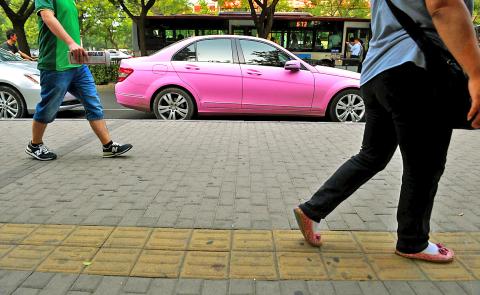China announced yesterday it would fine 12 Japanese auto parts suppliers a total of US$202 million for colluding to raise prices in an unfolding anti-monopoly probe of the country’s auto industry.
Beijing has launched a series of investigations into automakers and technology suppliers under its six-year-old anti-monopoly law, in an apparent effort to force down prices. Officials said earlier that Mercedes-Benz, Audi and Chrysler also violated the law.
The Japanese suppliers were found to have colluded improperly, some for up to 10 years, to raise prices of ball bearings and other parts, according to China’s National Development and Reform Commission.

Photo: AFP
“This harmed the legitimate rights and interests of consumers,” the commission said on its Web site.
PRICE COMPLAINTS
Regulators have given few details of the probe but industry analysts say they might have been motivated by complaints about the high price of imported luxury vehicles and replacement parts.
Two of the Japanese companies, ball bearing makers NSK Ltd and NTN Corp, announced on Tuesday they were among those being fined.
The others were components suppliers Hitachi Ltd, Denso Corp, Aisan Industry Co, Mitsubishi Electric Corp, Mitsuba Corp, Yazaki Corp and Furukawa Corp and bearings makers Nachi-Fujikoshi Corp and JTEKT Corp.
The commission said that the components makers were fined a total of 832 million yuan (US$136 million) and the bearings suppliers 403 million yuan, but it gave no breakdown by company.
COMPETITION LAW
The EU Chamber of Commerce in China, in a statement last week, said competition law should not be used to achieve other goals such as forcing price reductions.
The group said that it received reports regulators pressure companies to accept penalties without a full hearing and avoid involving their governments.
A Chinese Ministry of Commerce spokesman denied this week that foreign companies were treated unfairly.
On Monday, the government said Mercedes Benz was guilty of “vertical price-fixing.” It said the unit of Germany’s Daimler AG used its control over supplies of replacement parts to charge excessive prices.
Officials have said Volkswagen AG’s Audi luxury unit and Fiat Chrysler Automobile NV’s Chrysler would also face unspecified punishment for violating the law. Toyota Motor Co has said its Lexus unit is under scrutiny.
TECH FIRMS PROBED
Regulators also have announced investigations of Qualcomm Inc and Microsoft Corp.
Last year, Chinese regulators fined five foreign dairies and one from Hong Kong a total of US$108 million on charges they violated the anti-monopoly law by setting minimum prices for their distributors.

Sweeping policy changes under US Secretary of Health and Human Services Robert F. Kennedy Jr are having a chilling effect on vaccine makers as anti-vaccine rhetoric has turned into concrete changes in inoculation schedules and recommendations, investors and executives said. The administration of US President Donald Trump has in the past year upended vaccine recommendations, with the country last month ending its longstanding guidance that all children receive inoculations against flu, hepatitis A and other diseases. The unprecedented changes have led to diminished vaccine usage, hurt the investment case for some biotechs, and created a drag that would likely dent revenues and

Nvidia Corp’s GB300 platform is expected to account for 70 to 80 percent of global artificial intelligence (AI) server rack shipments this year, while adoption of its next-generation Vera Rubin 200 platform is to gradually gain momentum after the third quarter of the year, TrendForce Corp (集邦科技) said. Servers based on Nvidia’s GB300 chips entered mass production last quarter and they are expected to become the mainstay models for Taiwanese server manufacturers this year, Trendforce analyst Frank Kung (龔明德) said in an interview. This year is expected to be a breakout year for AI servers based on a variety of chips, as

Global semiconductor stocks advanced yesterday, as comments by Nvidia Corp chief executive officer Jensen Huang (黃仁勳) at Davos, Switzerland, helped reinforce investor enthusiasm for artificial intelligence (AI). Samsung Electronics Co gained as much as 5 percent to an all-time high, helping drive South Korea’s benchmark KOSPI above 5,000 for the first time. That came after the Philadelphia Semiconductor Index rose more than 3 percent to a fresh record on Wednesday, with a boost from Nvidia. The gains came amid broad risk-on trade after US President Donald Trump withdrew his threat of tariffs on some European nations over backing for Greenland. Huang further

HSBC Bank Taiwan Ltd (匯豐台灣商銀) and the Taiwan High Prosecutors Office recently signed a memorandum of understanding (MOU) to enhance cooperation on the suspicious transaction analysis mechanism. This landmark agreement makes HSBC the first foreign bank in Taiwan to establish such a partnership with the High Prosecutors Office, underscoring its commitment to active anti-fraud initiatives, financial inclusion, and the “Treating Customers Fairly” principle. Through this deep public-private collaboration, both parties aim to co-create a secure financial ecosystem via early warning detection and precise fraud prevention technologies. At the signing ceremony, HSBC Taiwan CEO and head of banking Adam Chen (陳志堅)